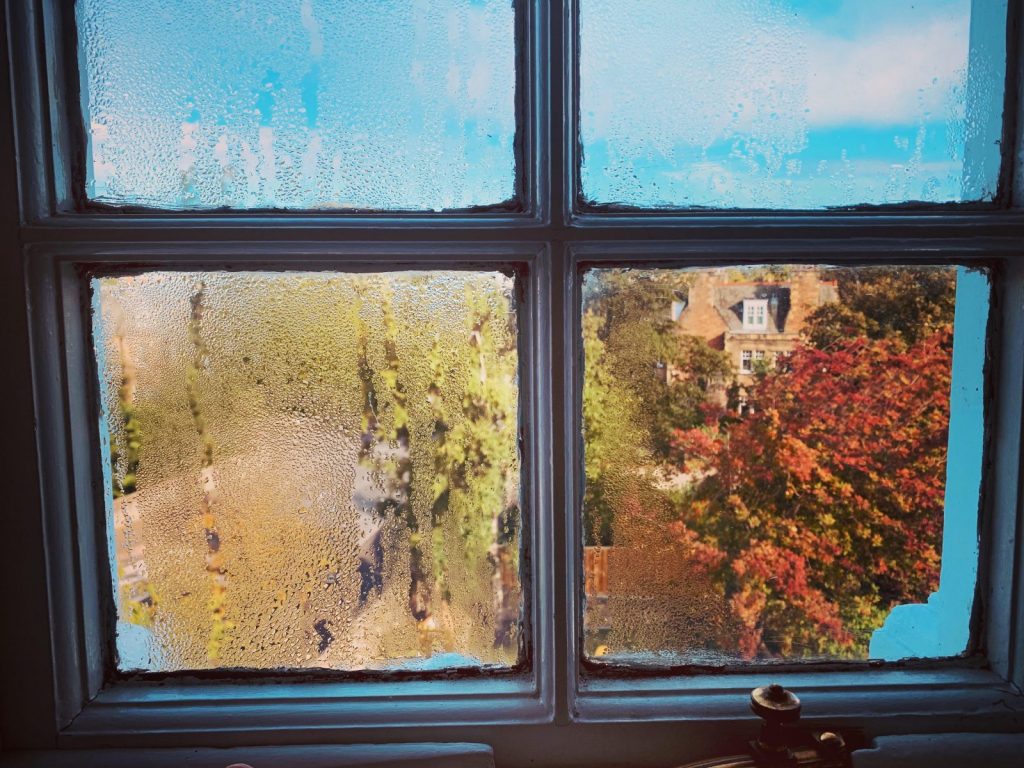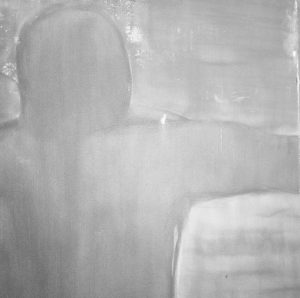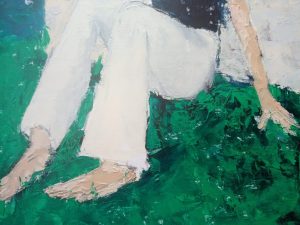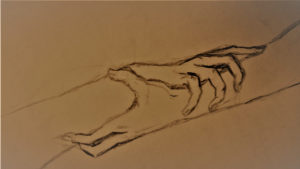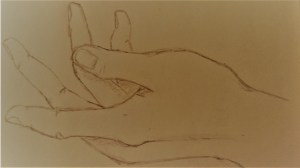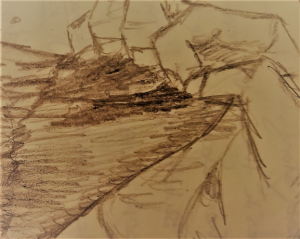Image: ‘6794393944_79354c3990_b.jpg’ © MarjorieBaillie. Source: CC by-nc-nd 2.0
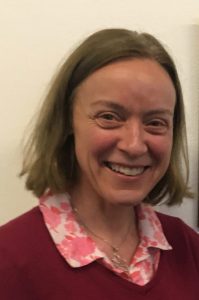
© Rachel Falconer
Author: Katharina Schwarck
As we all don’t really remember anything about our normal lives, let’s start talking a little about that: where are you isolating right now?
Okay, well, I’m mentally floating between Lausanne and where I am. I don’t know if you know the Narnian Chronicles? In the fifth book, there’s a place called the “wood between the worlds” where the children go and every pond they jump into is a different world but the wood between the worlds is a very sleepy in-between kind of place and they don’t quite know where they are. So that’s where I mentally am. But physically I’m in a small village outside of Oxford, with a big garden full of apple trees and wild animals, deer and foxes and badgers and my family, my English family. My dad is elderly so he is “shielding” and I do the shopping. She laughs. We manage it that way. In short, in a village outside Oxford beside a river and a garden full of wild animals is where I am.
In this virtual reality, what do you fill your days with?
Mostly preparing for classes. I don’t know how you find your zoom classes but I find them quite tiring to prepare for and tiring to be in. I mean, it’s lovely to see people, so there’s a kind of magic connection, especially with the geographic space as well, for me. So that’s wonderful. But at the same time it’s like all your energy is soaked up. So, I haven’t done any research since the lock-down. She chuckles. I’ve just been outside in the garden, reading my course books or inside, planning away, reading secondary criticism, things like that. Yeah, those are my days.
So, the typical question everybody seems to be asking these days: have you picked up any old or new hobby?
I’m playing my cello a lot more! I’m playing a piece by Bloch called “Prayer” which is very, very melancholic. I probably shouldn’t play it. It’s like the combined anguish from past centuries. She laughs. So, I’m playing that and a lovely light piece called “Sicilienne”. The cello is completely physical and it’s a completely different language. There’s a lot of background stress. I keep up with the news obsessively. So, in the middle of this beautiful May tranquillity you’re very aware of tragedy all around, and playing the cello helps get into a different space. It’s just a way to escape that world situation. So, I’m doing quite a bit of that. I’m also making friends with the animals in the garden and the people in the village, you know, across the walls. So, those are my hobbies.
Okay, let’s try and think back a little to how we used to be, in “the other times”. First of all, tell me a bit about your background. Where are you from? Where have you studied? Where have you worked?
Rachel laughs at the prospect of a long answer to my long question.
I think I have a lot of background but I don’t know where to start! I was born in Oxford, I went to nursery school in Glasgow and then moved to Toronto. I had my childhood in Toronto, in the city. My dad worked at the university of Toronto, in the French department. I remember days off from school when the streets were covered in snow and tobogganing down the streets. So, I think of Toronto as a time when you have days off in the winter. I went to a little French school, it was quite small but it meant that we were learning everything in two languages. The city streets that we lived in were extremely multicultural. So, I guess I got a taste for that already in Toronto.
My grandparents, even though they’re English, moved there in the 1920s when Canada was going through its modernism. They were very much involved with a group of Canadian painters who went up North, painting the Inuit cultures and the landscapes, and my grandmother went as their canoe-carrier. She was with these seven now quite famous male painters, and she was the one carrying their canoe and taking them around. And my grandfather was a professor in Toronto – this is on my mother’s side. My grandmother was the first woman to be hired by Toronto University in English. In fact, one of the first people that she lectured to was the famous Canadian critic Northrop Frye, and he just sat in the front row and opened a newspaper and read the whole time in protest at being lectured to by a woman. She was experiencing that kind of attitude in the 1930s and she was so nervous that she was sick before every lecture she gave. But she had a lot of courage, so she kept going.
I’ve been thinking about my grandparents a lot lately. They were part of a magazine called “The Canadian Forum” that was talking politically about opening up Canada to modernism and inventing a new language of painting and poetry. My grandmother went to Europe, toured around, met the Bauhaus, and motorcycled over to Russia to find out about theatre there, Chekhov and so on. It was quite exciting. They knew DH Lawrence and Frieda Lawrence, and went down to visit them in New Mexico. It was a big modernist moment, happening a bit later than in Europe. So, growing up in Toronto I felt kind of connected to this history of leaving behind a Victorian period and becoming modern, especially the women. It gives me a lot of strength to think about them. So that was my childhood.
She laughs.
Then we moved to Chappaqua, a little village outside of New York where my mother had had her childhood, or at least somewhere near there, in the northeast of the US. It was a very idyllic little town that my sister and I thought was too small for us. But there was a wonderful school where you were free to do art and music and theatre. Then I went to Yale University to study Classics. Basically, I chose that because the English department was totally riven between old-fashioned studies and deconstruction, post-structuralism, it was kind of the centre for deconstruction with Derrida and De Man and people like that. I was just a naïve 18-year-old and I didn’t like fights, so I did Classics to escape all of that. Yale was quite stressful, full of very brilliant, very neurotic, driven, ambitious people, even in the Classics department. So, I went to Rome for a year and had a nice relaxed time there. After that I came back to Oxford to take up English – and to take up rowing! I spent a lot of time on the river or reading. I stayed there to do an extra degree, a DPhil on Milton and Virgil. So that was the end of my schooling.
She laughs again, thinking about her very elaborate answer.
Where did I work? My first jobs were teaching posts at London and Oxford just to pay the bills. Then I went to Prague for two years to teach at the Charles University. Prague was very different just after the Velvet Revolution. It was like being thrown into the heart of a historical change, then moving from the Soviet Bloc to the West. My students were fantastically interesting to teach because they had not only undergone this revolution but orchestrated it, they were really the movement of change. It was the first time I saw an intellectual become president: a poet, a dramatist became president of the country. My students had been involved in the revolution and it had all been remarkably peaceful. So to see that kind of optimism and to see the arts suddenly revived and made free and at the head of cultural life… it’s really the only time in my life I’ve experienced that possibility. That was very exciting.
After that, I had to get a real job. I ended up in Sheffield in the North of England where I taught for the first half of my career, very happily. I love Sheffield. It’s hilly like Lausanne and surrounded by green and it’s a kind of funky and student-oriented city. My niece is there now and absolutely loves it. Yeah! I taught there for seventeen years. And then I moved here! In 2010. So that’s the circle.
That is beautiful! Before I pick up on those elements again, you’ve mentioned to me that you also used to be part of a student magazine?
I was actually in one at school! I was on the editorial team in my high school, so younger than you are now. It was fun. We got to write for it. That was great. I think that was my main publishing phase of my writing. It was called “Sartori”, I wrote poems about rabbits and elves and dream worlds. A bit embarrassing, really, to look back on. Oh, and I also wrote for the “Patent Trader”. It was a local newspaper, I did the human-interest stories for them. I got to interview people about their travels in India or cats stuck up trees, people with rare diseases. And when I worked in Prague, I also wrote for the English language newspaper there. That was a bit like working for a magazine in that I got to review all of these plays by playwrights who had been shut out of intellectual life until that year; they were beginning to open up little theatres like Theatre on the Balustrade, putting on Beckett and Shakespeare in their own, sort of, Czech way. So, I got to review those. My Czech was just good enough at that point to write that. That was a bit like a student magazine. But not like MUSE. MUSE is great. It’s an institution all of its own. I really admire it. I think you should definitely keep going. Yeah, keep going and keep interviews like this from staff short!, she says jokingly.
And right now, at UNIL, what are you specialised in and what made you get interested in that?
Well, what I’m not doing but what I will do when I get back to it is a book on Seamus Heaney and Virgil. So, it’s two poets, a contemporary and an ancient one and I suppose that unites my interest in contemporary literature and ancient literature. It keeps coming back to this story of the descent into the underworld, which I guess has a been a specialism of mine for the past ten years. I’ve written about descents into hell, descents into modern forms of hell and all modern forms of dream worlds. I think it’s been a long interest because it’s in a way one of the first forms of epic narrative! And I really like long stories, partly because they sustain you through your life and they have that sense of a life within them. I think they are some of the most ancient stories around. They’ve been with human culture really from the beginning. I think they enter different forms now; in films, epics are still really with us, whether in poetry or prose. And the story about going into the underworld, I guess, interests me because it has that fantasy element to it. It’s also sort of where you work out your own underworld or your own inner spirit. You find out your own roots. So, even if it’s within a largely secular context, I think we still have a sense of an underworld being a real place. Different people think about this in different ways.
Seamus Heaney’s underworlds involve the Classics and they also involve his own history in Ireland, which involves a kind of unconscious of culture. He really has a sense of a literary tradition which he’s tapping into as well as into himself. So, this book is a way to think about, maybe, that kind of journey into the underworld that the individual artist makes, but also how it hooks them into a sustaining tradition, and how we kind of bring that memory forward with us. So yeah! That’s what I should be working on.
And then in the background I have another project that has been ongoing since I got to Lausanne about birdsong and music and contemporary poetry. But it’s very difficult and I’m not really that much of an expert on birds or biology. But I love the aerial quality of poetry and the way, as we’ve been talking about in the Jamie course [this semester’s BA seminar on Ecopoetics and Kathleen Jamie], the way that poetry extends into non-human languages and non-human ways of thinking. I suppose it’s an extension of thinking about the epic, which is all about migrating into different worlds. I’m really fascinated by the edges of the human and talking to other creatures or listening to what they have to say. But I don’t really know how to write about that. So, that’s a project I have in the background. I do strange little articles about it and hopefully that will come together into some kind of shape after this Heaney book.
I’ve also heard that this year is your first year teaching ILA, now virtually of course. How has that experience been for you?
It’s great. I’ve really enjoyed it. It’s a bit more raw because this is most students’ first experience of university. They haven’t got sophisticated and cynical about the whole thing yet. My impression is of meeting people who are still learning this approach and when you drop a piece of work, a poem or a play into that learning pool of energy, it quickly becomes some new amazing plant that just has these thoughts from nowhere. I find that very exciting and I really miss seeing them face to face because that kind of connection with a work takes a human presence rather than a computer screen, I think. So, as they’re finding their roots I think it must be quite destabilising in their first year of university to be suddenly shunted into a virtual environment. I think it’s probably hardest for the first years, this transition. And they’re very bravely doing their best. Up until the lock-down, yeah, I just found enormous potential. People were just developing very, very quickly and growing into a university life. That’s really great to see. Yes, it’s a challenge but I really enjoy it.
I also think the student-teacher relationship is really special, and students might like to be reminded that their current teachers have been students too, and are still, in a way. We never stop learning. I’ve had wonderful English teachers from an early age, but if I had to single out three teachers who have changed my life, I would say they were Stanley Tucci – the father of the currently famous actor – who was my art teacher at school and who really trained my eye visually – a great, gifted artist. Then Lucy Newlyn, who taught me Romantic poetry at Oxford, Coleridge, especially. She is a poet herself now, who taught me to look for the ragged edges and the moments of fracture and failure from which we often derive our strengths. And Johanna Messner, my cello teacher, who has a wonderful, complex, aural imagination. It’s a joy to learn from her.
How awesome! What a beautiful conclusion. So, you’ve been in Lausanne for ten years!
Nearly, yeah! In August, it will be ten years.
So even though I know you’re not there right now, how have you liked Lausanne as a city over the years?
Well, I love it geographically. I love, obviously, the mountains and the lake and the way the city is laid out. So, the light and the mountains and the lake have made a big impression on me, like it does on every visitor. And then it’s very steeped in English literature. TS Eliot’s The Waste Land was written in Lausanne, or partly written there. So, in a way it’s coming home, but coming home in a displaced way. I love the real multilingualism, even more than in Canada. It is a place where polylinguistic facility just goes on all the time. So those are the things I love most about it.
But now I live in a village outside of Morges where it’s completely quiet. It’s a big attic space, a great place to go and work. I bought it because I can play the cello there without bothering anybody. But, you know, if you find yourself a bunker to live in, it’s still a bunker! So, I miss living in the heart of Lausanne, but it’s very expensive. I think I need to discover the soul of its funkiness. That will be my aim in the next five years, to discover the funky soul of Lausanne, which so far has eluded me. But it’s the most beautiful place I’ve ever lived. When I was interviewed for coming here, I had a terrible interview, I had this horrifying sense of witnessing paradise and that I had just blown my chances! But I got lucky and I got to live in paradise. Yeah, I’m grateful, unbelievably grateful to be here.
That’s beautiful! I’m so glad you enjoy Lausanne. And so, you have been in the English department for ten years as well! How does the UNIL English department differ from other institutions you’ve been in before?
Well, I think that’s what I love even more than Lausanne itself. I think our English department is like a family, really. I’ve worked in two or three other institutions, and I’ve never really experienced this sense of attachment elsewhere. I mean, it has the ups and downs of a family life, but there’s a very, very strong feeling of connection to your students and to your other members of staff, and a sense of obligation, which kind of is a burden as well. It’s a life attachment and I think we all feel, as far as I know, completely committed to the place and the department, as well as to our individual careers. I think it’s much more normal in a research English department to be devoted to your field and the colleagues in your field and to have an attachment to your authors and your libraries. All of which is true for us too! But what’s unique, in my experience anyway, is this sense of attachment to the department and every single person in it and their lives and their students. So, that’s what makes Lausanne special for me.
And concerning the students… it’s amazing how creative people are. I find it kind of unique to students and I think particularly the students in our department that I’ve been privileged to work with. There’s no limit to what people are willing to explore, taking English into music or into their arts or into theatre. Yes, I just feel like there’s this whole imaginative country that is available here to explore for the students who want to do that – I was very surprised to find that here. It wasn’t something I was necessarily looking for..
I guess, some of the things that stand out, to put flesh and bones on that, is how in one of my first years here I went to a production directed by Roelof Overmeer. He retired quite recently but he put on theatre productions all the time and they either tended to be very intense, with one or two people exploring his soul or Shakespeare’s soul or something. And then there were the other kinds of production which involved fifty people and it was completely carnivalesque and improvised and I really loved those, actually. There was one of The Tempest, which seemed to have every other member of the student body in it, at least thirty people on the stage at once. And it was in this makeshift theatre on the campus, not the Grange, but somewhere outside. It was really carnivalesque and wild. You couldn’t anticipate what was going to happen next but there were all of these brilliant cameo performances and that sense of theatre being a complete community experience, and Shakespeare at the heart of it. That was a great moment.
And then we had Kathleen Jamie here one year, very recently, and she read in the foyer of the Grange which is this beautiful building with columns and wooden rafters, and so it’s right for poetry. She’s quite a reserved, prickly character but during a question and answer, the students who’d been studying her just kept asking questions and the room just kind of warmed up and she warmed up. It was partly the space and the interest generated by the students and her very strong poetic voice that filled it. So, that was something that I think could’ve only happened there, or here, on our campus.
And I guess, what I like best, and this happens all the time so it’s difficult to think about a particular episode, is when a student starts saying something about a work you think you know well and it’s totally fresh. The top of your head just feels like it’s coming off because it opens up worlds for you that you thought were limited. That happens all the time. It happened in my Heaney seminar last semester almost every week. I also think you get a lot out of the MA memoirs, supervising them, because you get to see a student at the end of their studies pulling things together but discovering their own voice, discovering confidently how to become expert in a subject. So, this semester I have been supervising Laura Vogel, an MA student who developed her thesis from a course that was called “Animal and Child” and we looked at children’s literature and the representation of animals in it. She decided to do her memoir on this in Harry Potter and she’s become an expert on animal studies and animals in our culture and has gone way beyond what I know. It’s just wonderful to see somebody go far in their field and you get to know them working week by week and seeing them develop a mode of thought and a style that suits them. So I like that about our department too, you get this chance, really, to zero in on a particular student and help them further themselves.
Cool, now that we’ve talked about university and work, say we’re allowed to go anywhere we want and you’re independently wealthy and do not have to work. What would we find you doing with this time?
Wow, anywhere in the world? Well, I think I would have to go to the Galapagos, not to live there but to visit. I think I would go with my nieces, both of them who want to go and study the animals there. And having done that, I think one part of me would like to have a sculpture studio on the seaside. So, if I’m independently wealthy, I’ll do that. I’ll buy a little shack by the sea. Maybe close to Brighton so I could visit the city but I could be in my shack with my rock, sculpting.
That doesn’t really take much money so I think I would like to buy an island to have a sanctuary for all species, all waifs and strays in the world could come and live there, particularly retired working animals – donkeys and bears and animals that have had to be performing or working and have nowhere to go. So, I’d have this big island. It’d be full of creatures. I think people would be allowed in measure on the island as long as they liked all the other persons who are living there as well. And I would have to think in larger terms what I can do to contribute to changing our culture to something environmentally sustainable. I think that’s the big work that needs to be done by the people in the humanities as well as scientists, and that does mean working together. So, wherever I was I would try working with that community to find a sustainable way of existing. That means sharing your vegetables, water each other’s plants. Just a day to day interactivity that feeds the green world instead of destroying it. And I think that would take a while, so I would be busy doing that.
So, you mentioned Narnia earlier: if you could, what fictional place would you like to go to or visit?
Okay, so, I’ve been trying to get into Narnia since I was eight. I opened all the closets, I tried to open the tops of stairs with screw drivers, thinking it was behind there and left gaping holes in all the furniture in the house. And I thought I got there. I was quite a good liar, so I would come home from walks in the woods and tell my friends and my family that I had been to Narnia. They believed it, and I more than half believed it. So, in some ways I have been there already. But I would like now to go to Narnia but my own version of it. I don’t like the version that CS Lewis created anymore. Oh, that sounds sacrilegious because he created it, it’s his country but I would want to go to my version where it was not quite so anthropocentric.
So, I’d go to Narnia for the animals. I would go to the House of Elrond for the stories, I think. I love the idea of everybody gathering by the fire and playing their stories to music so I would go to the house of Elrond. And Lothlórien for the trees, obviously. So, it would have to be a mixture of the House of Elrond and Lothlórien in the Lord of the Rings, and Narnia. That would do. All made modern and ecocentric as well.
How lovely! Last question. I thought it was too boring and mainstream to ask you if you were a cat or a dog person so: what is your favourite type of bird?
Oh wow, that is very difficult. I can answer about the dogs and cats more easily. I like our ordinary garden birds because they’re with me daily and it would have to be between blackbirds and robins because I love bird song and the blackbirds are obviously the ones who sing… but robins interact with you. If you go out in my garden, here in Oxford, there’s a robin, six feet away, talking to you and looking at you. I think I’m an animal person rather than dog, cat or bird-. But I have to say I do love all dogs, whereas cats, I take on their individual merits. If they don’t kill birds. There’s a Siamese I’ve befriended because she’s rather awkward. She comes to visit, she looks lost, she looks confused, she’s not interested in birds, so I’ve started to give her cheese, I suppose I shouldn’t. But anyway, she comes to visit, she follows me around the house.
But it’s very difficult to say because the whole thing fascinates me, like I said, this interface with another creature who’s willing to learn your language and who also forces you to step out of your humanness a bit and to learn theirs. I just love that interaction, the shift in yourself that goes on and the shift in the creature that you’re interacting with. So, I suppose for the bird it would have to be a robin because I do get that sense of interspecies communication from them. I think it’s astonishing that they’re not afraid. They watch you and they listen. I even take my cello out and play Bach and they say, you know, “Shut up! Shut up! Shut up! I’m singing right here!” They don’t like it at all actually, they get quite disturbed. But yeah, there’s a great interaction. Garden robin. I’ll go for that.
Okay! Thank you so much. This was really lovely, it was really nice to talk to you and to get such lovely answers to all of these questions.
Thank you very much, I feel very honoured. It’s a pleasure to be interviewed.

